- Home
- Alice Munro
The Progress of Love
The Progress of Love Read online
Alice Munro
Alice Munro grew up in Wingham, Ontario, and attended the University of Western Ontario. She has published twelve collections of stories and two volumes of selected stories, as well as a novel. During her distinguished career she has been the recipient of many awards and prizes, including three of Canada’s Governor General’s Literary Awards and two of its Giller Prizes, the Rea Award for the Short Story, the Lannan Literary Award, England’s W. H. Smith Book Award, the United States’ National Book Critics Circle Award, the Edward MacDowell Medal in literature, and the Man Booker International Prize. Her stories have appeared in The New Yorker, The Atlantic Monthly, The Paris Review, and other publications, and her collections have been translated into thirteen languages. Alice Munro lives in Clinton, Ontario, near Lake Huron.
Also by Alice Munro
The View from Castle Rock
Carried Away
Runaway
Hateship, Friendship, Courtship, Loveship, Marriage
The Love of a Good Woman
Selected Stories
Open Secrets
Friend of My Youth
The Progress of Love
The Moons of Jupiter
The Beggar Maid
Something I’ve Been Meaning to Tell You
Lives of Girls and Women
Dance of the Happy Shades
FIRST VINTAGE INTERNATIONAL EDITION, DECEMBER 2000
Copyright © 1985, 1986 by Alice Munro
All rights reserved under International and Pan-American Copyright Conventions. Published in the United States by Vintage Books, a division of Random House, Inc., New York. Originally published in the United States by Alfred A. Knopf, a division of Random House, Inc., New York, in 1986.
Vintage is a registered trademark and Vintage International and colophon are trademarks of Random House, Inc.
A number of stories in this collection (some in slightly different form) were originally published in the following: “Eskimo” in Gentlemen’s Quarterly; “Monsieur les Deux Chapeaux” and “Fits” in Grand Street; “A Queer Streak” in Granta; “Jesse and Meribeth” (originally titled “Secrets Between Friends”) in Mademoiselle; “The Progess of Love,” “Lichen,” “Miles City, Montana,” “The Moon in the Orange Street Skating Rink,” and “White Dump” in The New Yorker; and “Circle of Prayer” in The Paris Review.
Grateful acknowledgment is made to Diplomat Music Corporation for permission to reprint an excerpt from “Today” by Lenny Stack and Janelle Cohen from the film C. C. & Co. Reprinted by permission.
The Library of Congress has cataloged the Knopf edition as follows:
Munro, Alice.
The progress of love.
p. cm.
I. Title.
PR9199.3.M8P7 1986
813′.54 86-45281
eISBN: 978-0-307-81456-2
Author photograph © Jerry Bauer
v3.1
For my sister, Sheila
CONTENTS
Cover
About the Author
Other Books by This Author
Title Page
Copyright
Dedication
The Progress of Love
Lichen
Monsieur les Deux Chapeaux
Miles City, Montana
Fits
The Moon in the Orange Street Skating Rink
Jesse and Meribeth
Eskimo
A Queer Streak
Circle of Prayer
White Dump
THE PROGRESS OF LOVE
I got a call at work, and it was my father. This was not long after I was divorced and started in the real-estate office. Both of my boys were in school. It was a hot enough day in September.
My father was so polite, even in the family. He took time to ask me how I was. Country manners. Even if somebody phones up to tell you your house is burning down, they ask first how you are.
“I’m fine,” I said. “How are you?”
“Not so good, I guess,” said my father, in his old way—apologetic but self-respecting. “I think your mother’s gone.”
I knew that “gone” meant “dead.” I knew that. But for a second or so I saw my mother in her black straw hat setting off down the lane. The word “gone” seemed full of nothing but a deep relief and even an excitement—the excitement you feel when a door closes and your house sinks back to normal and you let yourself loose into all the free space around you. That was in my father’s voice, too—behind the apology, a queer sound like a gulped breath. But my mother hadn’t been a burden—she hadn’t been sick a day—and far from feeling relieved at her death, my father took it hard. He never got used to living alone, he said. He went into the Netterfield County Home quite willingly.
He told me how he found my mother on the couch in the kitchen when he came in at noon. She had picked a few tomatoes, and was setting them on the windowsill to ripen; then she must have felt weak, and lain down. Now, telling this, his voice went wobbly—meandering, as you would expect—in his amazement. I saw in my mind the couch, the old quilt that protected it, right under the phone.
“So I thought I better call you,” my father said, and he waited for me to say what he should do now.
My mother prayed on her knees at midday, at night, and first thing in the morning. Every day opened up to her to have God’s will done in it. Every night she totted up what she’d done and said and thought, to see how it squared with Him. That kind of life is dreary, people think, but they’re missing the point. For one thing, such a life can never be boring. And nothing can happen to you that you can’t make use of. Even if you’re racked by troubles, and sick and poor and ugly, you’ve got your soul to carry through life like a treasure on a platter. Going upstairs to pray after the noon meal, my mother would be full of energy and expectation, seriously smiling.
She was saved at a camp meeting when she was fourteen. That was the same summer that her own mother—my grandmother—died. For a few years, my mother went to meetings with a lot of other people who’d been saved, some who’d been saved over and over again, enthusiastic old sinners. She could tell stories about what went on at those meetings, the singing and hollering and wildness. She told about one old man getting up and shouting, “Come down, O Lord, come down among us now! Come down through the roof and I’ll pay for the shingles!”
She was back to being just an Anglican, a serious one, by the time she got married. She was twenty-five then, and my father was thirty-eight. A tall good-looking couple, good dancers, good card-players, sociable. But serious people—that’s how I would try to describe them. Serious the way hardly anybody is anymore. My father was not religious in the way my mother was. He was an Anglican, an Orangeman, a Conservative, because that’s what he had been brought up to be. He was the son who got left on the farm with his parents and took care of them till they died. He met my mother, he waited for her, they married; he thought himself lucky then to have a family to work for. (I have two brothers, and I had a baby sister who died.) I have a feeling that my father never slept with any woman before my mother, and never with her until he married her. And he had to wait, because my mother wouldn’t get married until she had paid back to her own father every cent he had spent on her since her mother died. She had kept track of everything—board, books, clothes—so that she could pay it back. When she married, she had no nest egg, as teachers usually did, no hope chest, sheets, or dishes. My father used to say, with a somber, joking face, that he had hoped to get a woman with money in the bank. “But you take the money in the bank, you have to take the face that goes with it,” he said, “and sometimes that’s no bargain.”
The house we lived in had big, high rooms, with dark-green blinds on the window
s. When the blinds were pulled down against the sun, I used to like to move my head and catch the light flashing through the holes and cracks. Another thing I liked looking at was chimney stains, old or fresh, which I could turn into animals, people’s faces, even distant cities. I told my own two boys about that, and their father, Dan Casey, said, “See, your mom’s folks were so poor, they couldn’t afford TV, so they got these stains on the ceiling—your mom had to watch the stains on the ceiling!” He always liked to kid me about thinking poor was anything great.
When my father was very old, I figured out that he didn’t mind people doing new sorts of things—for instance, my getting divorced—as much as he minded them having new sorts of reasons for doing them.
Thank God he never had to know about the commune.
“The Lord never intended,” he used to say. Sitting around with the other old men in the Home, in the long, dim porch behind the spirea bushes, he talked about how the Lord never intended for people to tear around the country on motorbikes and snowmobiles. And how the Lord never intended for nurses’ uniforms to be pants. The nurses didn’t mind at all. They called him “Handsome,” and told me he was a real old sweetheart, a real old religious gentleman. They marvelled at his thick black hair, which he kept until he died. They washed and combed it beautifully, wet-waved it with their fingers.
Sometimes, with all their care, he was a little unhappy. He wanted to go home. He worried about the cows, the fences, about who was getting up to light the fire. A few flashes of meanness—very few. Once, he gave me a sneaky, unfriendly look when I went in; he said, “I’m surprised you haven’t worn all the skin off your knees by now.”
I laughed. I said, “What doing? Scrubbing floors?”
“Praying!” he said, in a voice like spitting.
He didn’t know who he was talking to.
I don’t remember my mother’s hair being anything but white. My mother went white in her twenties, and never saved any of her young hair, which had been brown. I used to try to get her to tell what color brown.
“Dark.”
“Like Brent, or like Dolly?” Those were two workhorses we had, a team.
“I don’t know. It wasn’t horsehair.”
“Was it like chocolate?”
“Something like.”
“Weren’t you sad when it went white?”
“No. I was glad.”
“Why?”
“I was glad that I wouldn’t have hair anymore that was the same color as my father’s.”
Hatred is always a sin, my mother told me. Remember that. One drop of hatred in your soul will spread and discolor everything like a drop of black ink in white milk. I was struck by that and meant to try it, but knew I shouldn’t waste the milk.
• • •
All these things I remember. All the things I know, or have been told, about people I never even saw. I was named Euphemia, after my mother’s mother. A terrible name, such as nobody has nowadays. At home they called me Phemie, but when I started to work, I called myself Fame. My husband, Dan Casey, called me Fame. Then in the bar of the Shamrock Hotel, years later, after my divorce, when I was going out, a man said to me, “Fame, I’ve been meaning to ask you, just what is it you are famous for?”
“I don’t know,” I told him. “I don’t know, unless it’s for wasting my time talking to jerks like you.”
After that I thought of changing it altogether, to something like Joan, but unless I moved away from here, how could I do that?
In the summer of 1947, when I was twelve, I helped my mother paper the downstairs bedroom, the spare room. My mother’s sister, Beryl, was coming to visit us. These two sisters hadn’t seen each other for years. Very soon after their mother died, their father married again. He went to live in Minneapolis, then in Seattle, with his new wife and his younger daughter, Beryl. My mother wouldn’t go with them. She stayed on in the town of Ramsay, where they had been living. She was boarded with a childless couple who had been neighbors. She and Beryl had met only once or twice since they were grown up. Beryl lived in California.
The paper had a design of cornflowers on a white ground. My mother had got it at a reduced price, because it was the end of a lot. This meant we had trouble matching the pattern, and behind the door we had to do some tricky fitting with scraps and strips. This was before the days of pre-pasted wallpaper. We had a trestle table set up in the front room, and we mixed the paste and swept it onto the back of the paper with wide brushes, watching for lumps. We worked with the windows up, screens fitted under them, the front door open, the screen door closed. The country we could see through the mesh of screens and the wavery old window glass was all hot and flowering—milkweed and wild carrot in the pastures, mustard rampaging in the clover, some fields creamy with the buckwheat people grew then. My mother sang. She sang a song she said her own mother used to sing when she and Beryl were little girls.
“I once had a sweetheart, but now I have none.
He’s gone and he’s left me to weep and to moan.
He’s gone and he’s left me, but contented I’ll be,
For I’ll get another one, better than he!”
I was excited because Beryl was coming, a visitor, all the way from California. Also, because I had gone to town in late June to write the Entrance Examinations, and was hoping to hear soon that I had passed with honors. Everybody who had finished Grade 8 in the country schools had to go into town to write those examinations. I loved that—the rustling sheets of foolscap, the important silence, the big stone high-school building, all the old initials carved in the desks, darkened with varnish. The first burst of summer outside, the green and yellow light, the townlike chestnut trees, and honeysuckle. And all it was was this same town, where I have lived now more than half my life. I wondered at it. And at myself, drawing maps with ease and solving problems, knowing quantities of answers. I thought I was so clever. But I wasn’t clever enough to understand the simplest thing. I didn’t even understand that examinations made no difference in my case. I wouldn’t be going to high school. How could I? That was before there were school buses; you had to board in town. My parents didn’t have the money. They operated on very little cash, as many farmers did then. The payments from the cheese factory were about all that came in regularly. And they didn’t think of my life going in that direction, the high-school direction. They thought that I would stay at home and help my mother, maybe hire out to help women in the neighborhood who were sick or having a baby. Until such time as I got married. That was what they were waiting to tell me when I got the results of the examinations.
You would think my mother might have a different idea, since she had been a schoolteacher herself. But she said God didn’t care. God isn’t interested in what kind of job or what kind of education anybody has, she told me. He doesn’t care two hoots about that, and it’s what He cares about that matters.
This was the first time I understood how God could become a real opponent, not just some kind of nuisance or large decoration.
My mother’s name as a child was Marietta. That continued to be her name, of course, but until Beryl came I never heard her called by it. My father always said Mother. I had a childish notion—I knew it was childish—that Mother suited my mother better than it did other mothers. Mother, not Mama. When I was away from her, I could not think what my mother’s face was like, and this frightened me. Sitting in school, just over a hill from home, I would try to picture my mother’s face. Sometimes I thought that if I couldn’t do it, that might mean my mother was dead. But I had a sense of her all the time, and would be reminded of her by the most unlikely things—an upright piano, or a tall white loaf of bread. That’s ridiculous, but true.
Marietta, in my mind, was separate, not swallowed up in my mother’s grownup body. Marietta was still running around loose up in her town of Ramsay, on the Ottawa River. In that town, the streets were full of horses and puddles, and darkened by men who came in from the bush on weekends. Loggers. There were
eleven hotels on the main street, where the loggers stayed, and drank.
The house Marietta lived in was halfway up a steep street climbing from the river. It was a double house, with two bay windows in front, and a wooden trellis that separated the two front porches. In the other half of the house lived the Sutcliffes, the people Marietta was to board with after her mother died and her father left town. Mr. Sutcliffe was an Englishman, a telegraph operator. His wife was German. She always made coffee instead of tea. She made strudel. The dough for the strudel hung down over the edges of the table like a fine cloth. It sometimes looked to Marietta like a skin.
Mrs. Sutcliffe was the one who talked Marietta’s mother out of hanging herself.
Marietta was home from school that day, because it was Saturday. She woke up late and heard the silence in the house. She was always scared of that—a silent house—and as soon as she opened the door after school she would call, “Mama! Mama!” Often her mother wouldn’t answer. But she would be there. Marietta would hear with relief the rattle of the stove grate or the steady slap of the iron.
That morning, she didn’t hear anything. She came downstairs, and got herself a slice of bread and butter and molasses, folded over. She opened the cellar door and called. She went into the front room and peered out the window, through the bridal fern. She saw her little sister, Beryl, and some other neighborhood children rolling down the bit of grassy terrace to the sidewalk, picking themselves up and scrambling to the top and rolling down again.
“Mama?” called Marietta. She walked through the house to the back yard. It was late spring, the day was cloudy and mild. In the sprouting vegetable gardens, the earth was damp, and the leaves on the trees seemed suddenly full-sized, letting down drops of water left over from the rain of the night before.
“Mama?” calls Marietta under the trees, under the clothesline.
At the end of the yard is a small barn, where they keep firewood, and some tools and old furniture. A chair, a straight-backed wooden chair, can be seen through the open doorway. On the chair, Marietta sees her mother’s feet, her mother’s black laced shoes. Then the long, printed cotton summer work dress, the apron, the rolled-up sleeves. Her mother’s shiny-looking white arms, and neck, and face.

 Runaway
Runaway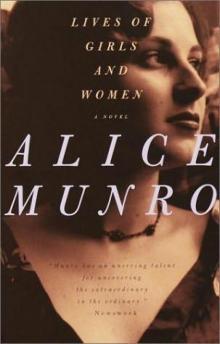 Lives of Girls and Women
Lives of Girls and Women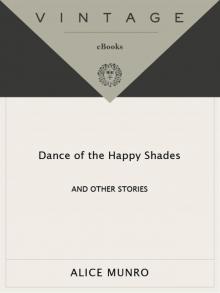 Dance of the Happy Shades
Dance of the Happy Shades Open Secrets
Open Secrets Julieta (Movie Tie-in Edition)
Julieta (Movie Tie-in Edition)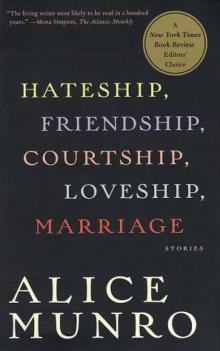 Hateship, Friendship, Courtship, Loveship, Marriage: Stories
Hateship, Friendship, Courtship, Loveship, Marriage: Stories Alice Munro's Best
Alice Munro's Best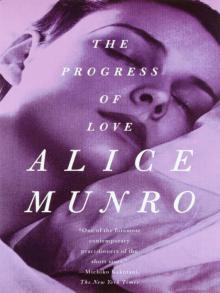 The Progress of Love
The Progress of Love Selected Stories
Selected Stories Away from Her
Away from Her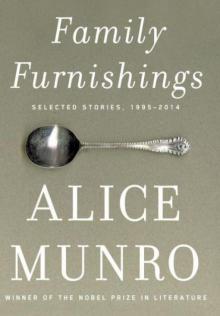 Family Furnishings
Family Furnishings Moons of Jupiter
Moons of Jupiter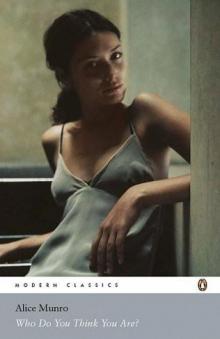 Who Do You Think You Are?
Who Do You Think You Are? Hateship, Friendship, Courtship, Loveship, Marriage
Hateship, Friendship, Courtship, Loveship, Marriage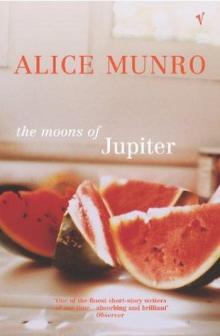 The Moons of Jupiter
The Moons of Jupiter Vintage Munro
Vintage Munro The Love of a Good Woman
The Love of a Good Woman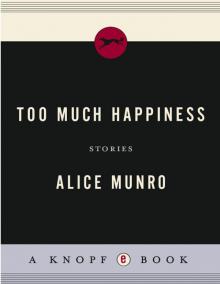 Too Much Happiness
Too Much Happiness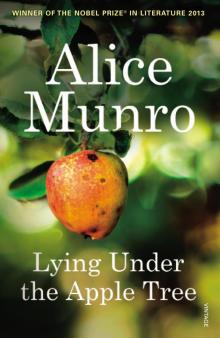 Lying Under the Apple Tree
Lying Under the Apple Tree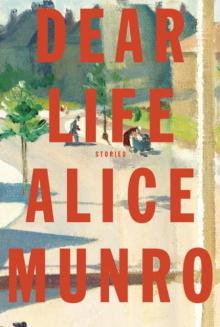 Dear Life
Dear Life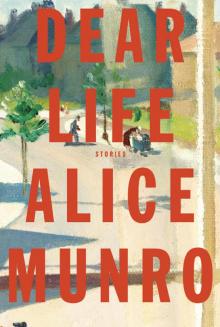 Dear Life: Stories
Dear Life: Stories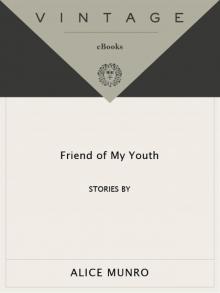 Friend of My Youth
Friend of My Youth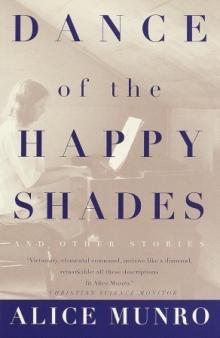 Dance of the Happy Shades: And Other Stories
Dance of the Happy Shades: And Other Stories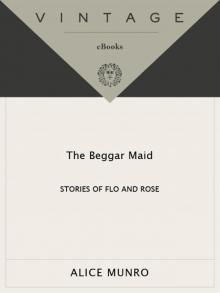 The Beggar Maid
The Beggar Maid